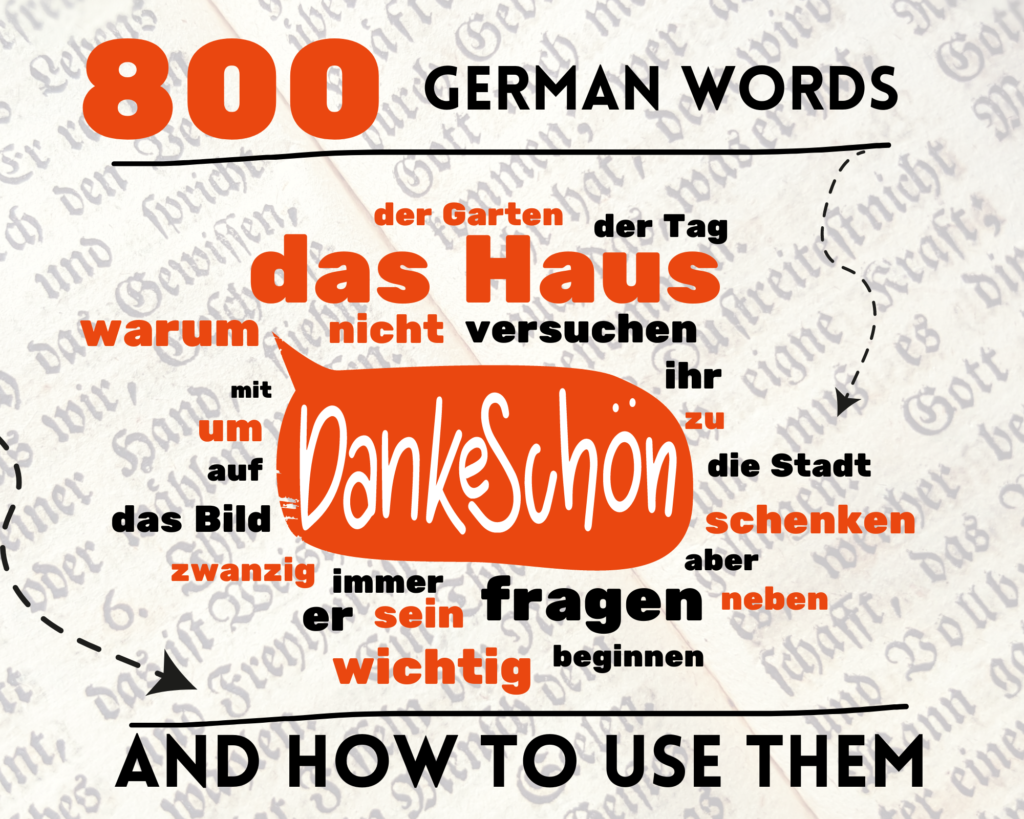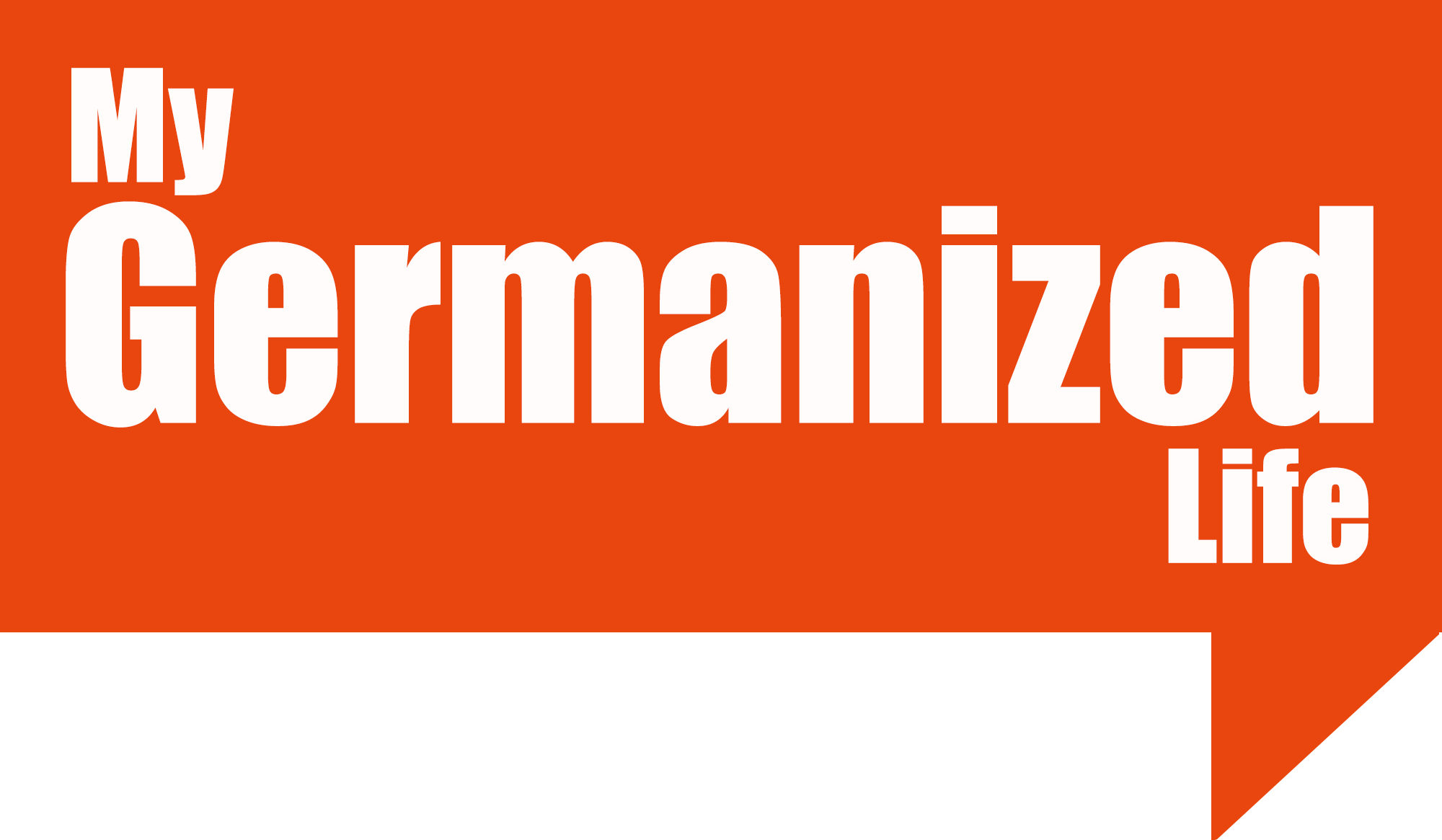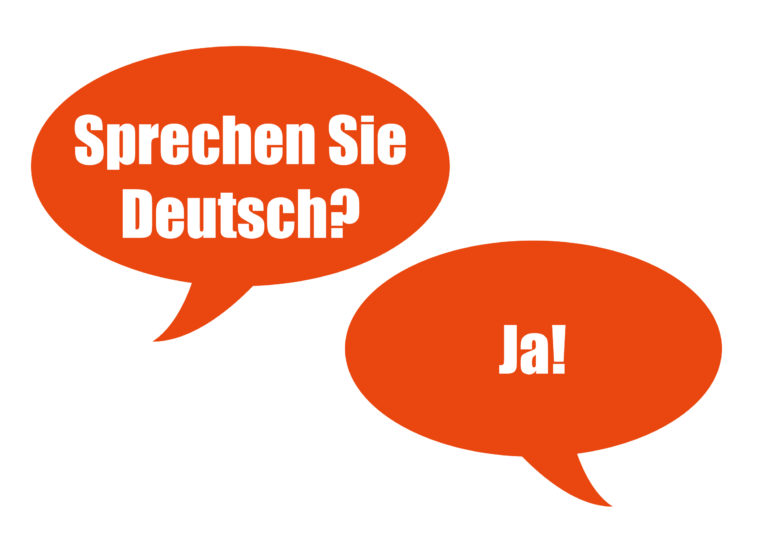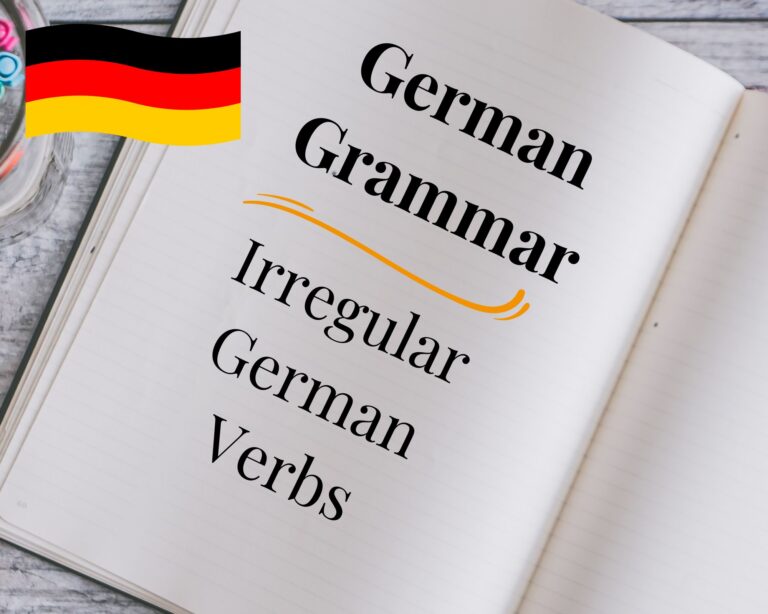
These most common German words form the cornerstone of your German language learning. Whether you’re a beginner or looking to brush up your skills, familiarizing yourself with these words will empower you to navigate conversations, understand texts, and dive into German culture.
In this post, you’ll not only get a list of over 800 of the most common German words, but you’ll also learn how to use them. That way, you can accelerate your German skills rapidly and start using the language right away.
Table of Contents
- The Pronouns in German (ich, du, wir)
- Most Common German Words: Verbs
- The Most Common German Words: Nouns
- Most Common German Words: Prepositions
- Must-Know German Conjunctions
- Definite and Indefinite Articles
- Common German Words: Adverbs and Adjectives
- One Final Thought
The Pronouns in German (ich, du, wir)
Pronouns are those handy little words like “I,” “you,” and “it” that keep conversations flowing smoothly. These words also appear frequently in conversations, so they’re worth memorizing.
| Nominative | Accusative | Dative | Genitive (possessive) |
| ich – I | mich – I/me | mir – me | mein |
| du – you | dich – you | dir – you | dein |
| er – he | ihn – he/him | ihm – him | sein |
| sie – she | sie – she | ihr – her | ihr |
| es – it | es – it | ihm – it | sein |
| sie – they/them | sie – they/them | sie – they/them | ihr |
| Sie – you formal | Sie – you formal | Ihr – you formal | Ihr |
| wir – we | wir – we | uns – us | unser |
Pronouns, those little words like “I,” “you,” “he,” “she,” and “it,” may seem modest, but their role in German language proficiency is nothing short of crucial. They replace nouns and provide clarity, flow, and brevity in conversations.
But to use German pronouns correctly, you’ll need to learn about the German case system. It’s essential to understand when to use each case so you can choose the correct forms of the words.
Most Common German Words: Verbs
German verbs are the backbone of every sentence. Let’s look at the regular verbs first, and then the irregular verbs.
The Most Common Regular German Verbs
Regular German verbs follow a consistent pattern when conjugated in different tenses. Here are the basic steps:
- Infinitive Form: Start with the base form of the verb, which is the infinitive form (e.g., “spielen” – to play).
- Remove the “-en” Ending: For regular verbs, remove the “-en” from the infinitive form. This leaves you with the stem (e.g., “spiel”).
- Add the Correct Ending: Depending on the subject pronoun (I, you, he/she/it, we, you all, they), add the appropriate ending to the stem.
- Ich (I): Add “-e” (e.g., spiele)
- Du (You – informal singular): Add “-st” (e.g., spielst)
- Er/Sie/Es (He/She/It): Add “-t” (e.g., spielt)
- Wir (We): Add “-en” (e.g., spielen)
- Ihr (You all – informal plural): Add “-t” (e.g., spielt)
- Sie (They): Add “-en” (e.g., spielen)
- Sie (You – formal): Add “-en” (e.g., spielen)
Remember, this pattern applies to most regular verbs in the present tense. Here are some of the most common German regular verbs:
- antworten – reply
- arrangieren – arrange
- bauen – build
- bedeuten – mean
- begeistern – excite
- begünstigen – favor
- beobachten – observe, watch
- berühren – touch
- besiedeln – populate
- bestellen – order
- bestimmen – determine
- betrachten – consider
- buchstabieren – spell
- danken – thank
- dienen – serve
- diskutieren – discuss
- entwickeln – develop
- erfordern – require
- erleichtern – ease
- erreichen – reach
- erwarten – expect
- folgen – follow
- glauben – believe
- hinzufügen – add
- kaufen – buy
- kleiden – cloth
- kühlen cool
- leben – live
- lehren – teach
- lernen – learn
- lokalisieren – locate
- lösen – solve
- machen – make
- malen – paint
- merken – remember
- mischen – mix
- multiplizieren – multiply
- passen – fit
- passieren – happen, pass
- pflücken – pick
- produzieren – produce
- protokollieren – log
- regeln – settle
- regieren – govern
- sammeln – collect, gather
- schaffen – create
- schützen – protect
- senden – send
- sparen – save
- spielen – play
- subtrahieren – subtract
- suchen – look
- träumen – dream
- trennen – separate
- überqueren – cross
- umfassen – include
- variieren – vary
- verkaufen – sell
- versuchen – try
- vertreten – represent
- vorbereiten – prepare
- vorstellen – imagine, introduce
- wählen – choose, select, vote
- warten – wait
- zählen – count
- zahlen – pay
- ziehen – draw, pull
The Most Common Irregular German Verbs
Irregular German verbs, on the other hand, are the rule-breakers of the German verb family. These verbs deviate from the standard conjugation patterns, often undergoing significant changes in their stems or endings.
While they may seem daunting at first, mastering irregular verbs is an essential step towards true proficiency in German. These verbs are so commonly used that it’s virtually impossible to hold a conversation without encountering them.
- abhängen – depend
- abweichen – differ
- ankommen – arrive
- aufladen – charge
- auftreten – occur
- aus – off
- beginnen – to begin
- beitreten – join
- bekommen – get
- beschreiben – describe
- besitzen – own
- betreiben – operate
- beweisen – prove
- bieten – provide
- bleiben – stay
- brennen – burn
- bringen – bring
- denken – think
- drücken – push
- eingeben – enter
- einreiben – rub
- empfangen – receive
- enthalten – contain
- entscheiden – decide
- erfinden – invent
- erhalten – get
- erhöhen – raise
- erraten – guess
- erscheinen – appear
- essen – eat
- fallen – to fall
- fangen – catch
- finden – find
- fliegen – fly
- fließen – flow
- fortsetzen – continue
- fühlen – feel
- führen – guide, lead
- füllen – fill
- geben – give
- geboren – born
- gehen – go, walk
- gewinnen – win
- gleichsetzen – equate
- haben – have
- halten – keep, hold
- hoffen – hope
- hören – hear, listen
- klingen – sound
- kommen – come
- können – may, can
- lassen – let
- laufen – run
- legen – lay
- lesen – read
- messen – measure
- müssen – must, have to
- nehmen – take
- regen – rain
- sagen – say, tell
- scheinen – seem
- schlagen – beat
- schließen – close
- schreiben – write
- schwimmen – swim
- sehen – see
- sein – to be
- setzen – put
- singen – sing
- sitzen – to sit
- sollen – should
- sprechen – speak
- springen – jump
- stehen – stand
- steigen rise
- sterben – die
- tragen – bear, carry, wear
- treffen – hit, meet
- trocken – dry
- tun – to do
- überprüfen – check
- verbinden – connect
- verbringen – spend
- vergleichen – compare
- verlassen – leave
- verloren – lost
- vorschlagen – suggest
- wachsen – grow
- werden – to become
- werfen – throw
- wissen – know
- wollen – want
- wünschen – wish
- würden – would
- zeigen – show
- zustimmen – agree
If you need a reference sheet of irregular German verbs and their conjugation patterns, check out this resource from the University of Michigan.
The Most Common German Words: Nouns
In German, all nouns are capitalized. This is a fundamental difference from English. When writing, remember to capitalize every noun, whether it’s a person, place, thing, or abstract concept.
German Noun Genders
In German, nouns are assigned one of three genders: masculine (der), feminine (die), or neuter (das). While there are some general rules to guide German noun gender assignment, there are many exceptions, and memorization is often the most effective method. It’s essential to learn nouns together with their definite articles (der, die, das) to ensure correct usage.
Masculine (der): Often, nouns denoting male beings are masculine, but exceptions exist. Additionally, days, months, seasons, and weather phenomena are typically masculine.
Example: der Mann (the man), der Tag (the day), der Sommer (the summer)
Feminine (die): Female beings and nouns referring to female-specific objects tend to be feminine. Additionally, the names of cars, motorcycles, and certain types of fruit are feminine.
Example: die Frau (the woman), die Blume (the flower), die Tomate (the tomato)
Neuter (das): Inanimate objects and very young living beings are generally neuter. Additionally, diminutives often fall into this category.
Example: das Haus (the house), das Kind (the child), das Mädchen (the girl)
- die Abbildung – figure
- die Abdeckung – cover
- der Abend – evening
- der Absatz – paragraph
- der Abschnitt – section
- die Achtung – danger
- der Akkord – chord
- der Akt – act
- die Aktie – share
- das Alter – age
- das Angebot – offer
- die Angst – fear
- die Anlage – plant
- der Anruf – call
- der Anspruch – claim
- der Antrieb – drive
- die Antwort – answer
- die Anzahl – number
- der Anzug – suit
- der Apfel – apple
- die Arbeit – work
- der Ärger – trouble
- der Arm – arm
- die Art – kind
- der Arzt – doctor
- das Atom – atom
- der Aufstieg – climb
- der Aufzug – lift
- das Auge – eye
- der Augenblick – instant
- der Ausdruck – phrase
- das Auto – car
- der/die/dasBand – band
- die Basis – base
- der Bauernhof – farm
- der Baum – tree
- die Baumwolle – cotton
- der Beginn – start
- der Begriff – term
- das Bein – leg
- das Beispiel – example
- der Bereich – area
- der Berg – mountain
- der Besuch – visit
- das Bett – bed
- die Bewegung – motion
- das Bild – picture
- das Bit – bit
- das Blatt – sheet
- der Blick – view, sight
- der Block – block
- die Blume – flower
- das Blut – blood
- der Boden – ground, soil, floor, bottom
- das Boot – boat
- das Brot – bread
- der Bruder – brother
- das Buch – book
- das Büro – office
- die Chance – chance
- der Charakter – character
- die Dame – lady
- der Dampf – steam
- die Dauer – duration
- die Dezimal – decimal
- der Dollar – dollar
- das Dorf – village
- der Draht – wire
- die Drei – three
- das Dreieck – triangle
- der Druck – print
- die Ebene – floor
- die Ecke – corner
- das Ei – egg
- die Eile – hurry
- die Einheit – unit
- das Eis – ice
- das Eisen – iron
- das Element – element
- das Elternteil – parent
- die Energie – energy
- die Ente – duck
- der Entwurf – the draft
- die Erde – earth, planet
- die Erfahrung – experience
- der Erfolg – success
- das Ergebnis – result
- die Erlaubnis – permission
- die Ernte – crop
- die Fahrt – ride
- der Fall – case
- die Falte – crease
- die Familie – family
- der Fang – catch
- die Farbe – color
- der Fehler – mistake
- die Feige – fig
- der Feind – enemy
- das Feld – field
- das Fenster – window
- das Feuer – fire
- der Filz – felt
- das Finale – finale
- der Finger – finger
- die Firma – company
- der Fisch – fish
- die Fledermaus – bat
- das Fleisch – meat
- der Flügel – wing
- das Flugzeug – plane
- der Fluss – river
- die Flüssigkeit – liquid
- die Form – shape
- das Formular – form
- die Frage – question
- die Fraktion – fraction
- die Frau – woman, wife
- die Frauen – women
- die Freude – joy
- der Freund – friend
- die Front – front
- der Frühling – spring
- der Funk – radio
- der Fuß – foot
- das Futter – feed
- der Garten – garden
- der Gebiss – teeth
- der Gedanke – thought
- das Gedicht – poem
- das Gegenteil – opposite
- der Geist – mind
- das Geld – money
- der Geruch – smell
- das Geschäft – shop
- die Geschichte – history, story
- die Geschicklichkeit – skill
- die Geschwindigkeit – speed
- das Gesetz – law
- das Gesicht – face
- das Getränk – drink
- das Gewicht – weight
- der Glanz – shine
- das Glas – glass
- die Glocke – bell
- das Grad – degree
- das Gras – grass
- die Größe – size
- der Grund – reason
- die Gruppe – group
- das Haar – hair
- der Hafen – port
- die Hälfte – half
- der Hals – neck
- der Halt –stop
- die Hand – hand
- der Handel – trade
- die Hauptsache – main thing
- die Hauptstadt – capital
- das Haus – house
- die Haut – skin
- das Herz – heart
- die Hilfe – help
- der Himmel – sky
- der Hinweis – notice, hint
- der Hof – yard
- das Holz – wood
- der Hügel – hill
- der Hund – dog
- der Hut – hat
- die Idee – idea
- die Immobilien – property
- die Industrie – industry
- das Insekt – insect
- die Insel – island
- das Instrument – instrument
- die Interesse – interest
- die Jagd – hunt
- das Jahr – year
- das Jahrhundert – century
- der Junge – boy
- die Kälte – cold
- der Kampf – fight
- der Kapitän – captain
- die Karte – card, map
- die Katze – cat
- das Kind – child
- die Kinder – children
- die Klasse – class
- das Kleid – dress
- die Kluft – divide
- der Knochen – bone
- der Koch – cook
- die Kolonie – colony
- der König – king
- der Konsonant – consonant
- der Kontinent – continent
- die Kontrolle – control
- der Kopf – head
- die Kopie – copy
- der Körper – body
- die Kosten – cost
- die Kraft – force
- die Krawatte – tie
- der Kreis – circle
- der Krieg – war
- die Kugel – ball, scoop
- die Kuh – cow
- die Kunst – art
- der Kurs – course
- die Küste – coast
- das Lächeln – smile, laugh
- das Lager – camp
- das Land – country
- der Lärm – noise
- der Lastwagen – truck
- das Leben – life
- die Lebensmittel – food
- die Leiste – bar
- das Licht – light
- die Liebe – love
- das Lied – song
- die Linie – line
- die Liste – list
- das Loch – hole
- die Lösung – solution
- die Luft – air
- die Lüge – lie
- die Macht – power
- das Mädchen – girl
- der Magnet – magnet
- der Mais – corn
- der Mann – man
- die Männer – men
- die Mannschaft – team
- der Mantel – coat
- die Marke – mark
- der Markt – market
- die Maschine – machine
- die Masse – mass
- der Maßstab – scale
- das Materiel – matter, material
- das Meer – sea
- die Meile – mile
- die Melodie – melody
- die Menge – crowd
- der Mensch – human
- die Menschen – people
- die Messe – fair
- das Metall – metal
- die Milch – milk
- die Million – million
- die Mine – mine
- die Minute – minute
- der Mittag – noon
- die Mitte – middle
- das Molekül – molecule
- der Moment – moment
- der Monat – month
- der Mond – moon
- der Morgen – morning
- der Motor – engine
- der Mund – mouth
- die Musik – music
- das Muster -pattern
- die Mutter – mother
- der Nachbar – neighbor
- die Nacht – night
- die Nähe – nearness (Note: “in der Nähe von” means “near”)
- der Name – name
- die Nase – nose
- die Nation – nation
- die Natur – nature
- das Nomen – noun
- der Norden – north
- die Notiz – note
- die Oberfläche – surface
- das Objekt – object
- das Obst – fruit
- das Ohr – ear
- das Öl – oil
- das Orgel – organ
- das Original – original
- der Ort – place
- der Osten – east
- der Ozean – ocean
- das Paar – pair
- der Papa – dad
- das Papier – paper
- die Partei – party
- die Pause – break
- die Person – person
- das Pferd – horse
- die Pflanze – plant
- die Pflege – care
- das Pfund – pound
- die Pistole – gun
- der Plan – plan
- der Platz – square
- die Pose – pose
- die Position – position
- die Praxis – practice
- die Presse – press
- das Problem – problem
- das Produkt – product
- der Prozess -process
- die Prüfung – test
- der Punkt – point
- der Quotient – quotient
- das Rad – wheel
- der Rand – edge
- der Raum – space
- das Recht – right
- die Rede – speech
- die Regel – rule
- die Region – region
- der Reifen – tire
- die Reihe – row
- die Reise – travel, trip
- die Religion –religion
- das Rennen – race
- der Rest – rest
- der Ring – ring
- das Rohr – tube
- die Rolle – roll
- die Runde – round
- der Rutsch – slip
- die Sache – thing
- die Säge – saw
- die Saison – season
- das Salz – salt
- der Samen – seed
- der Sand – sand
- der Satz – set/ sentence
- der Sauerstoff – oxygen
- die Schale – shell
- die Schiene – rail
- das Schiff – ship
- der Schlaf – sleep
- der Schlag – blow
- der Schlüssel – key
- der Schnee – snow
- der Schnitt – cut
- die Schnur – string
- die Schönheit – beauty
- der Schrank – the cabinet
- der Schrei – cry, shout
- das Schreiben – letter
- der Schritt – step
- der Schuh – shoe
- die Schule – school
- der Schüler – student
- die Schulter – shoulder
- der Schwanz – tail
- die Schwester – sister
- der See – lake
- das Segel – sail
- das Segment – segment
- das Seil – rope
- die Seite – page/side
- die Silbe – syllable
- das Silber – silver
- der Sinn – sense
- der Sitz – seat
- der Sklave – slave
- der Sohn – son
- der Soldat – soldier
- der Sommer – summer
- die Sonne – sun
- die Spalte – column
- der Spaß – fun
- die Speiche – spoke
- der Speicher – store
- das Spiel – game, match
- die Sprache – language
- die Spur – trace
- die Stadt – city/town
- der Stahl – steel
- der Stamm – tribe
- der Start – begin
- die Station – station
- der Stein – rock, stone
- die Stelle – spot
- der Stern – star
- die Stimme – voice
- die Straße – street, road
- die Strecke – stretch
- der Strom – current, stream
- das Stück – piece
- die Studie – study
- der Stuhl – chair
- die Stunde – hour
- die Substanz – substance
- die Suche – search
- der Süden – south
- das Suffix – suffix
- das System – system
- die Tabelle – chart, table
- der Tag – day
- das Tal – valley
- der Tanz – dance
- die Tatsache – fact
- das Teil – part
- die Teilung – division
- die Temperatur – temperature
- das Thema – subject
- das Tier – animal
- der Tod – death
- der Ton – tone
- die Tonhöhe – pitch
- die Tür – door
- der Typ – type
- die Überraschung – surprise
- die Übung – exercise
- die Ufer – shore
- die Uhr – clock
- der Umzug – move
- die Unterstützung – support
- die Ursache – cause
- der Vater – father
- die Veränderung – change
- die Veranstaltung – event
- die Verbreitung – spread
- das Verb – verb
- das Verfahren – method
- die Vergangenheit – past
- die Versorgung – supply
- der Versuch – experiment
- die Verwendung – use
- der Vogel – bird
- der Vokal – vowel
- der Vortrag – talk
- der Wald – forest
- die Wand – wall
- die Wärme – heat
- die Wäsche – laundry
- das Wasser – water
- der Weg – path, way
- die Welle – wave
- die Welt – world
- das Werkzeug – tool
- der Wert – value
- der Westen – west
- das Wetter – weather
- die Wiederholung – repetition
- der Wind – wind
- der Winter – winter
- die Wirkung – effect
- die Wissenschaft – science
- die Woche – week
- die Wohnung – flat
- die Wolke – cloud
- das Wort – word
- das Wörterbuch – dictionary
- das Wunder – wonder
- die Wurzel – root
- die Wüste – desert
- die Zahl – numeral
- das Zeichen – sign, symbol
- die Zeit – period, time
- die Zelle – cell
- das Zentrum – center
- das Zimmer – room
- der Zoll – inch
- der Zorn – wrath
- der Zucker – sugar
- der Zug – train
- die Zukunft – the future
- der Zustand – condition, state
- der Zweig – twig
Most Common German Words: Prepositions
Prepositions are vital components of any language, including German. They help establish relationships between elements in a sentence, such as indicating location, direction, time, and more. Here are some of the most common German prepositions along with their English equivalents:
| Accusative Prepositions | Dative Prepositions | Changing Prepositions |
| durch – by, through | aus – from, out | an – on |
| für – for | außer – except for | auf – on. toward |
| gegen – against | bei – at, in | hinter – behind |
| ohne – without | mit – with | in – in |
| um – in order to | nach – after | neben – next to |
| seit – since | oben – above | |
| von – of | unter – among, under | |
| zu – to | über – about/over | |
| vor – ago, before | ||
| neben – next to | ||
| zwischen – between |
Using German prepositions correctly in sentences requires an understanding of their meanings and the German cases they govern. German prepositions can take either the accusative, dative, or genitive case, depending on the relationship they establish between elements in a sentence. Here’s a guide on how to use German prepositions in sentences:
Accusative Case Prepositions
Prepositions indicating direction or motion towards a location usually take the accusative case.
- Accusative (Akkusativ): Used to indicate the direct object of a verb, motion towards a location, or duration of time.
For example:
- “Ich gehe durch den Park.” (I walk through the park.)
- “Sie fahren um den See.” (They drive around the lake.)
- “Wir bleiben für eine Woche.” (We are staying for a week.)
- “Er arbeitet ohne dich.” (He is working without you.)
The accusative prepositions are underlined in the above sentences. Directly after these prepositions, you can see the noun or pronoun in the accusative case in bold.
Dative Case Prepositions
After a dative preposition, use the dative case.
- Dative (Dativ): Used to indicate the indirect object of a verb or location where an action takes place.
Here are some examples of dative prepositions in sentences.
- “Er kommt aus der Schweiz.” (He comes from Switzerland.)
- “Wir fahren zum (zu + dem) Bahnhof.” (We’re driving to the station.)
- “Ich bekomme ein Geschenk von dir.” (I get a gift from you.)
- “Sie sitzt mit mir.” (She is sitting with me.)
The dative prepositions are underlined in the above sentences. Directly after these prepositions, you can see the noun or pronoun in the dative case in bold.
Changing Prepositions in German
Two-way prepositions in German can take either the accusative or dative case, depending on their usage in the sentence.
- Accusative – when a change in location or position is being expressed, use the accusative case. For example, “Ich liege das Buch auf den Tisch.” (I lay the book on the table.) Here, the book is moving from one location to another, so we use the accusative article “den” after the preposition.
- Dative – When an object remains static, use the dative case. For example, “Das Buch liegt auf dem Tisch.” (The book is lying on the table.) Here, the book is stationary on the table, so we use the dative article “dem” for the table.
Remember, if there is movement, use the accusative, and if there is no movement, use the dative case.
Must-Know German Conjunctions
These conjugations are words you’ll use frequently to connect phrases together in German.
- aber – but
- als – than
- auch – also
- bis – until
- da – there
- dann – then
- dass – that
- entweder – either
- hier – here
- ob – whether
- obwohl – though
- oder – or
- so – such/thus
- statt – instead
- und – and
- während – while/during
- weder, noch – neither, nor
- wenn – when/if
- wie – as/ how/like
- zurück – back
Definite and Indefinite Articles
- andere – other
- deren, dessen – whose
- die, der, das – the, which, who
- diejenigen – those
- dies – this
- diese – these
- ein – a, one
- einige – some
- jeder – each/any/every
Common German Words: Adverbs and Adjectives
These German adverbs and adjectives are some of the most frequently used descriptive words.
- ähnlich -similar
- alle – all
- allgemein – general
- alt – old
- am meisten – most
- am wenigsten – least
- ängstlich – afraid
- arm – poor
- auch – also
- bald – soon
- beide – both
- bereit – ready
- berühmt – famous
- beschäftigt – busy
- besondere – particular, special
- besser – better
- beste – best
- blau – blue
- braun – brown
- breit – broad, wide
- dick – thick
- direkt – direct
- doppelt – double
- dunkel – dark
- dünn – thin
- eher – rather
- einfach – simple
- einsam – lone
- elektrisch – electric
- entfernt – distant
- erforderlich – necessary
- fähig – able
- falsch – wrong
- fein – fine
- fett – fat
- frisch – fresh
- froh – glad
- früh – early
- ganz – quite
- ganze – whole
- gehalten – kept
- gelb – yellow
- gemeinsam – common
- gemeint – meant
- genau – exact
- genug – enough
- geöffnet – open
- gerade – straight
- gesamt – total
- geschrieben – written
- gleich – equal, same
- glücklich – happy
- golden – gold
- grau – gray
- groß – great/big/grand
- grün – green
- gut – well/good
- heiß – hot
- hell – bright
- hoch – high, tall
- immer – always
- in der Nähe von – near
- insbesondere – especially
- je – ever
- jetzt – now
- jung – young
- klar – clear
- klein – small
- kostenlos – free
- kurz – short
- lange – long
- laut – loud
- letzte – last
- links – left
- mehr – more
- mehreren – plural
- möglich – possible
- nächste – next
- natürlich – natural
- neu – new wenig – little
- nie – never
- niedrig – low
- noch – still, yet
- nur – just, only
- obere – top
- oft – often
- pleite – broke
- plötzlich – sudden
- real – real
- reich – rich
- richtig – correct, proper
- riesig – huge
- rot – red
- ruhig – quiet
- sanft – gentle
- sauber – clean
- scharf – sharp
- schlecht – bad
- schleppend – slow
- schnell – fast
- schwarz – black
- schwer – hard, heavy
- schwierig – difficult
- sehr – very
- selbst – self
- seltsam – strange
- sicher – certain, safe
- sicher – sure
- sonst – else
- spät – late
- stark – strong
- still – silent
- tief – deep
- üblich – usual
- viel – much
- viele – many
- vielleicht – perhaps
- voll – full
- vollständig – complete
- vorbei – gone
- vorhanden – present
- vorwärts – forward
- wahr – true
- wahrscheinlich – probable
- warm – warm
- weich – soft
- weiß – white
- weit – far
- wenig – few
- weniger – less
- wieder – again
- wiederum – turn
- wild – wild
- winzig – tiny
- ziemlich – pretty
- zu – too
- zusammen – together
Most Common German Numbers
- eins – one
- zwei – two
- drei – three
- vier – four
- fünf five
- sechs six
- sieben – seven
- acht – eight
- neun – nine
- zehn – ten
- einmal – once
- Einzel – single
- erste – first
- zweite – second
- dritte – third
- zwanzig – twenty
- hundert – hundred
- tausend – thousand
- mehrere – several
Most Common German Words for Questions
- warum – why
- wo – where
- woher – from where
- wer – who
- was – what
- wo – where
- wann – when
- wieso – how come
A Few More Common German Words
- nicht no
- nichts nothing
- ja yes
- oh oh
- bitte please
- liebe dear
One Final Thought
These common German words can help you start building your vocabulary in German. Review your vocabulary frequently and try to use it actively by writing German sentences. And remember, grammar is equally important and necessary to progress in your language studies. Reading German books and watching German TV or movies is also a great way to recall new words and can be a fun way to practice the language.





